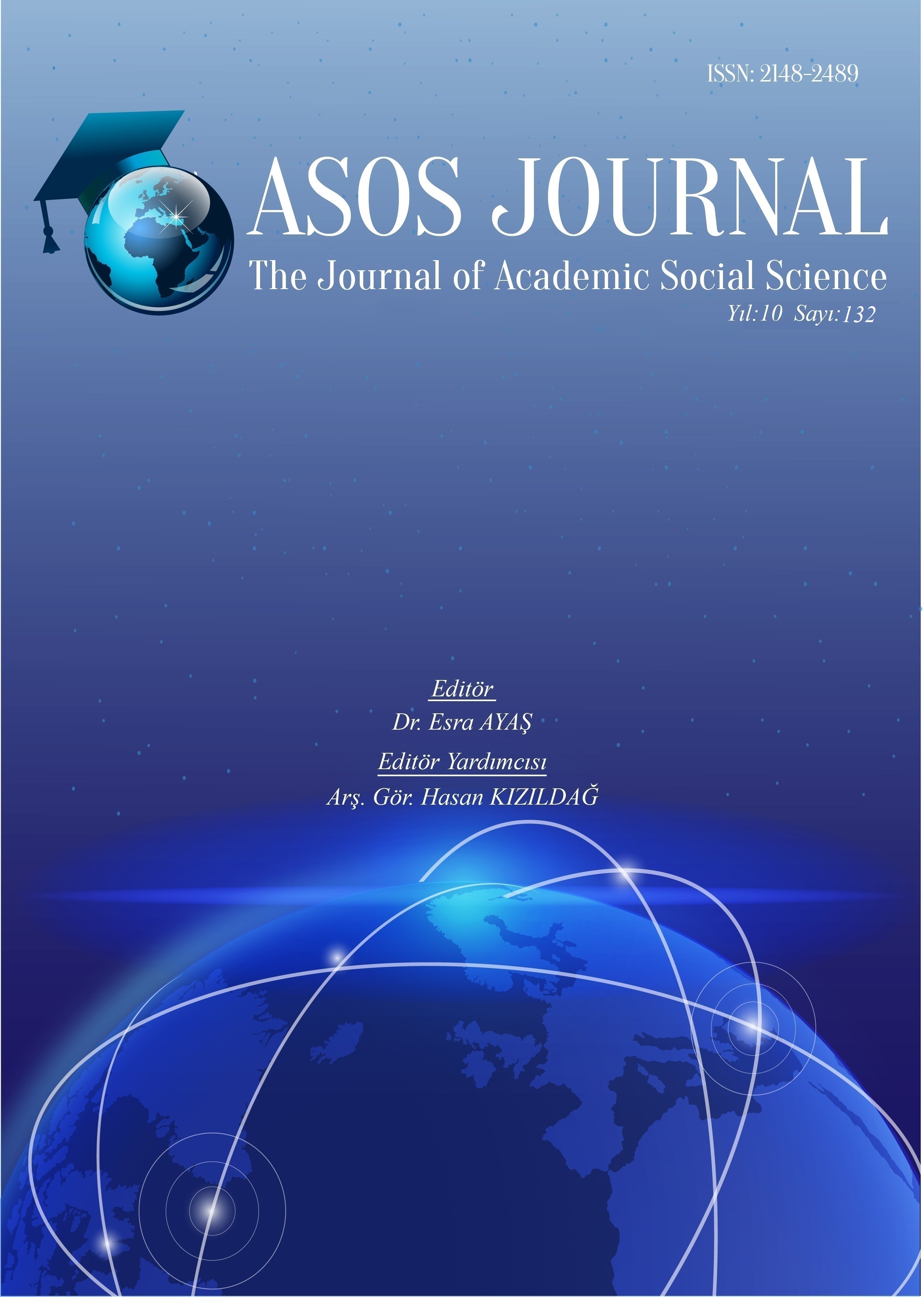Author :
Abstract
Osmanlı Devleti bünyesinde çok farklı etnik ve dinî yapıyı barındıran cihanşümul bir devlettir. Aynı şekilde Diyarbakır da bünyesinde Müslüman ahalinin yanı sıra gayrimüslim unsurları da barındıran kadim bir İslam-Osmanlı şehridir. Osmanlı hukuku, İslam hukuk tarihinde kendine özgü yorumlarla şekillenmiş, örfî ve şer‘î hukukun mezcedildiği bir yapıya sahiptir. Bu hukuk sisteminin tabii olarak gayrimüslimler için getirmiş olduğu çeşitli hükümler söz konusudur. Buna göre, Osmanlı Devleti’nde klasik fıkıh doktrinine uygun olarak tebaa, dinî ve siyasî bir tanımlamayla müslim ve gayrimüslim olarak iki şekilde tanımlanmış, tebaası olsun veya olmasın gayrimüslimlerin tamamına ise harbî, muâhid, müste’men ve zimmî gibi farklı hukukî statüler atfedilmiştir. Bunlardan zimmîlerin hukukî pratikleri bu çalışmanın konusunu oluşturmaktadır. Makalede XVII-XIX. yüzyıl Âmid (Diyarbakır) Mahkemesine yansıyan kayıtlar üzerinden gayrimüslimlerin nişanlanma, evlenme, boşanma, nafaka, miras, vasiyet, vakıf, alım-satım, vekâlet, kefalet vb. hukukî tasarruflarının bir fotoğrafı sunulmaktadır.
Keywords
Abstract
The Ottoman Empire is a world-wide state that contains many different ethnic and religious structures. Likewise, Diyarbakir is an ancient Islamic-Ottoman city that includes non-Muslim elements as well as Muslims. Ottoman law has a structure that has been shaped by its own interpretations in the history of Islamic law, combining customary and sharia law. Naturally, this legal system has various provisions for non-Muslims. Accordingly, in the Ottoman Empire, in accordance with the classical fiqh doctrine, the subject was defined in two ways as Muslim and non-Muslim with a religious and political definition, and different legal statuses such as harbî (A citizen of a non-Muslim state at war with the Islamic state), muâhid (A citizen of a non-Muslim state with which a peace treaty was made for a certain period of time), muste’men (Foreign non-Muslim who entered the Islamic country with effective legal protection) and dhimmi (Non-Muslim subjects living in Islamic countries) were attributed to all non-Muslims, whether they were subjects or not. The legal practices of the dhimmis are the subject of this study. In the article XVII-XIX. Century Âmid (Diyarbakır) Court of non-Muslims engagement, marriage, divorce, alimony, inheritance, will, foundation, purchase-sale, power of attorney, bail, etc. a photograph of their legal practices is presented.
Keywords
- Aydın, M. A. (2007). Osmanlılar. Türkiye Diyanet Vakfı İslam Ansiklopedisi içinde (Cilt. 33, s. 515-521). TDV Yayınları.
- Bardakoğlu, A. (2013). Vesâyet. Türkiye Diyanet Vakfı İslam Ansiklopedisi içinde (Cilt. 43, s. 66-70). TDV Yayınları.
- Bilgiç, V. K. (2013). Osmanlı Devleti’nde azınlıklar. İslam Hukuku Araştırmaları Dergisi, 21, 339-354.
- Erkal, M. (1993). Cizye. Türkiye Diyanet Vakfı İslam Ansiklopedisi içinde (Cilt. 8, s. 42-45). TDV Yayınları.
- Esen, H. (2005). İslam Hukukunda ölümün mâlî hak ve borçlara etkisi. Cumhuriyet Üniversitesi İlahiyat Fakültesi Dergisi, 9 (1), 55-86.
- Gedikli, F. (2014). Osmanlı Devletinde birlikte yaşama kültürü. Avrasya Hukuk Kurultayı- tebliğler kitabı içinde (ss.430-432). Bilnet Matbaacılık.
- Gedikli, F. (2007). Şer’iyye Sicillerinin hukuk tarihi açısından önemi ve sicillere dayalıaraştırmalar”. Ali Akyıldız v.dğr. (Ed), Dünden Bugüne Osmanlı Araştırmaları-Tespitler-Problemler-Teklifler içinde (s. 73-96). T.D.V. Yayın Matbaacılık ve Ticaret İşletmesi.
- Gümüş, E. (2014). 18. Yüzyılın İlk Yarısında Amid Kazası. Yayınlanmamış doktora tezi, Gazi Üniversitesi Sosyal Bilimler Enstitüsü.
- Günay, H. M. (2012). Vakıf. Türkiye Diyanet Vakfı İslam Ansiklopedisi içinde (Cilt. 42, s. 475- 479). TDV Yayınları.
- Güneş, G. A. (2015). Osmanlı Devleti’nin gayrimüslimlere bakışı ve klasik dönem millet sistemi. Sosyal ve Kültürel Araştırmalar Dergisi (SKAD), 1(2), 1-30.
- Güneş, M. (2014). Osmanlı dönemi nüfus sayımları ve bu sayımları içeren kayıtların tahlili. Akademik Bakış, 8(15), 221-240.
- İnalcık, H. (1958). Osmanlı Hukukuna giriş örfi-sultani hukuk ve Fatih’in kanunları. Ankara Üniversitesi Siyasal Bilgiler Fakültesi Dergisi, 13(2), 102-126.
- Karataş, M. (2012). Mahkeme kayıtlarına göre XVII. ve XVIII. yüzyıllarda Diyarbekir’de gayrimüslimler. Elektronik Sosyal Bilimler Dergisi, 11(42), 393-422.
- Kılıç, M. T. (2016). Teori ve Pratiği Bağlamında İslam Hukuku (18. Yüzyıl Diyarbakır Örneği). A Grafik.
- Kurtaran, U. (2011). Osmanlı İmparatorluğu’nda millet sistemi. Kafkas Üniversitesi Sosyal Bilimler Enstitüsü Dergisi, 8, 57-71.
- Ortaylı, İ. (2005). Millet. Türkiye Diyanet Vakfı İslam Ansiklopedisi içinde (Cilt. 30, s. 66-70).Özel, A. (1996). Gayrimüslim. Türkiye Diyanet Vakfı İslam Ansiklopedisi içinde (Cilt. 13, s.Satış, İ. (2016). Osmanlı Devleti’nde Ermeni Katolik Cemaatine dair Âli Paşa ve Kastro Bey’in lâyihâları. Akademik Bakış, 9(18), 253-254.
- Yaman, A. (2015). İslam’ın temel kaynakları ve tarihî tecrübe ışığında gayri müslimlerle birlikteyaşamanın hukukî çerçevesi. Necmettin Erbakan Üniversitesi İlahiyat Fakültesi Dergisi, 40, 9-36.
- Yılmazçelik, İ. (2011). XIX. yüzyılda Diyarbakır şehrinin nüfusu ve nüfus hareketleri. TümYönleriyle Diyarbakır 2. Sempozyumu bildiriler kitabı İçinde (ss.29-68). Efil Yayınevi.Yiğit, M. (2009). Fıkhî ölçüler ışığında gayrimüslimlerin hukukî statüsü. Dicle Üniversitesi İlahiyat Fakültesi Dergisi, 11(2), 151-168.
- Zeydan, A. (1994). İslam Hukukuna göre zimmîler. çev. Hasan Güleç. Dokuz Eylül Üniversitesi İlahiyat Fakültesi Dergisi, 7(435), 431-440.
- Zeydan, A. (1982). Ahkâmu’z-Zimmîyyîn ve’l-Müste’mîn fî Dâri’l-İslâm. Mektebetü’l-Kuds.





